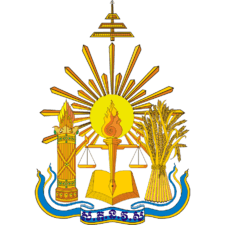Royal University of Law and Economics
The Royal University of Law and Economics (Khmer: សាកលវិទ្យាល័យភូមិន្ទនីតិសាស្ត្រនិងវិទ្យាសាស្ត្រសេដ្ឋកិច្ច, French: Université royale de droit et des sciences économiques, abbreviated as RULE) is one of the oldest higher educational institutions in Cambodia.[2]
សាកលវិទ្យាល័យភូមិន្ទនីតិសាស្ត្រ និងវិទ្យាសាស្ត្រសេដ្ឋកិច្ច | |
 | |
| Type | National |
|---|---|
| Established | 1949[1] |
| Rector | Dr. Luy Channa |
Academic staff | 1,438 |
| Students | 15,672 (2013–2014)[1] |
| Undergraduates | 14,015 (2013–2014)[1] |
| Postgraduates | 1,657 (2013–2014)[1] |
| Address | 93 Preah Monivong Boulevard , , |
| Affiliations | Agence Universitaire de la Francophonie ASEAN University Network |
| Website | www.rule.edu.kh |
RULE was established in 1949 as the National Institute of Law, Politics and Economics. In 2003, the institution was officially deemed a university.
Background
RULE is the first higher education institution in Cambodia. It was founded in 1948 as the National Institute of Law, Politics and Economics. In 1957 the institute became the faculty by Royal Decree. In 2003 the Faculty of Law and Economics was reorganized as a university, under the name of Royal University of Law and Economics. Other disciplines of social and natural sciences, such as language and computer sciences have been added to the curriculum.
The university has four faculties, two graduate schools and one center, teaching law, economics and business.
Staff and students
In 2003, there were 4,800 undergraduate students studying in the four faculties, among them were 1,478 female students. Newly established graduate schools accommodate 507 graduate students. There are 84 full-time and 112 visiting Cambodian lecturers and 70 foreign lecturers who give lectures under the academic exchange programs.
Academic programs
The educational term/grade level system has been divided into semesters, with eight semesters in the period of four years for bachelor's degree program.
Undergraduate degree programs
Faculty of Public Administration
Bachelor's in Public Administration
Faculty of Economics and Management
- Bachelor in Economics
- Bachelor of Business Administration
- Bachelor in Accounting
- Bachelor in Finance and Banking
Faculty of Information Economics
- Bachelor in Information Economics
Graduate degree programs
Graduate School of Law
- Master of Public Administration (MPA)
- Master in Private Law (MPL)
- Master in International Business Law and Corporate Counsel (MIB)
Graduate School of Economics and Management
- Master of Business Administration (MBA)
- Master of Business Administration in Finance (MBA-Finance)
- Master of Business Administration in Marketing (MBA-Marketing)
- Master in Tourism Management